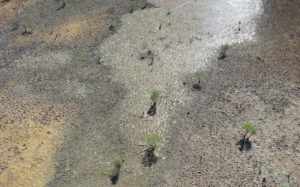28 November 2017
The wetlands and floodplains of the Archer River support outstanding biodiversity, provide many ecosystem services and have significant Indigenous cultural values. Large feral animals such as buffalo, cattle, horses and especially feral pigs are impacting these wetlands and floodplains, resulting in physical damage, changes to how waterholes function, and the loss of bush tucker and traditional knowledge about these resources. A hub project led by Dr Justin Perry of CSIRO, is aiming to support more effective management of these feral animals. Over the dry season, researchers have been working closely with Indigenous partners. Family visits with Traditional Owners in Aurukun have helped the team gain a better understanding of the social and cultural impacts of feral animals in the Archer catchment, while hundreds of new aerial wetland photos are helping to place individual waterholes into ‘types’ so we can better understand and model how pigs use them – the photos will also serve as a reference for future monitoring. The waterhole mapping protocols developed will be useful in other catchments, and booklets on how to monitor waterhole impacts are being drafted.

Feral pig damage in an Archer River wetland, photo Justin Perry.
Want to know more about the Resilient Landscapes Hub's activities and our research into practical solutions to environmental problems? Stay informed about activities, research, publications, events and more through the Hub newsletter.
"*" indicates required fields